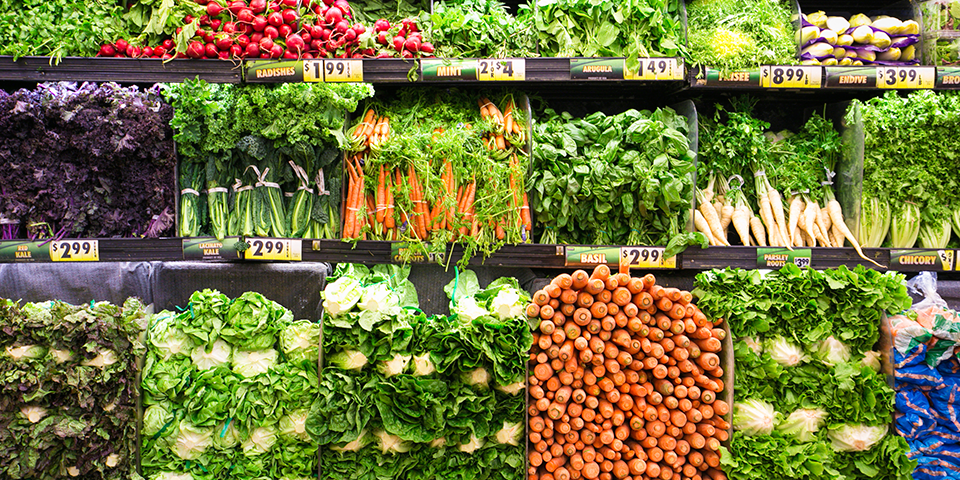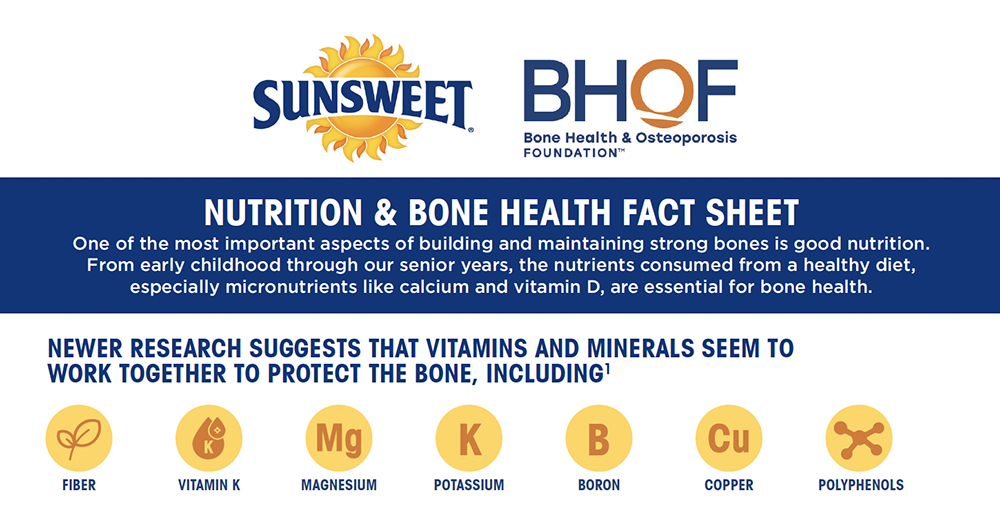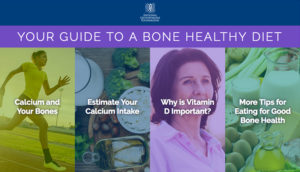Food For Thought Quiz
Food and Your Bones — Osteoporosis Nutrition Guidelines
The food that you eat can affect your bones. Learning about the foods that are rich in calcium, vitamin D and other nutrients that are important for your bone health and overall health will help you make healthier food choices every day. Use the chart below for examples of the different types of food you should be eating every day.
If you eat a well-balanced diet with plenty of dairy, fish, fruits and vegetables, you should get enough of the nutrients you need every day, but if you’re not getting the recommended amount from food alone, you may need to complement your diet by taking multivitamins or supplements.
Nutrition and Bone Health
Fact Sheet
Good-for-Your-Bones Foods
| Food | Nutrient |
|---|---|
| Dairy products such as low-fat and non-fat milk, yogurt and cheese | Calcium. Some dairy products are fortified with Vitamin D. |
| Fish | |
| Canned sardines and salmon (with bones) | Calcium |
| Fatty varieties such as salmon, mackerel, tuna and sardines | Vitamin D |
| Fruits and vegetables | |
| Collard greens, turnip greens, kale, okra, Chinese cabbage, dandelion greens, mustard greens and broccoli. | Calcium |
| Spinach, beet greens, okra, tomato products, artichokes, plantains, potatoes, sweet potatoes, collard greens, prunes and raisins. | Magnesium |
| Tomato products, prunes, raisins, potatoes, spinach, sweet potatoes, papaya, oranges, orange juice, bananas and plantains. | Potassium |
| Red peppers, green peppers, oranges, grapefruits, broccoli, strawberries, brussels sprouts, papaya and pineapples. | Vitamin C |
| Prunes. Dark green leafy vegetables such as kale, collard greens, spinach, mustard greens, turnip greens and brussel sprouts. | Vitamin K |
| Fortified Foods | |
| Calcium and vitamin D are sometimes added to certain brands of juices, breakfast foods, soy milk, rice milk, cereals, snacks and breads. | Calcium, Vitamin D |

More Examples of Bone Healthy Food
Recent research has found that olive oil, soy beans, blueberries and foods rich in omega-3s, like fish oil and flaxseed oil may also have bone boosting benefits. While additional research is needed before the link between these foods and bone health can definitively be made, the many overall health benefits of these foods make them excellent choices to add to your diet. Studies have also shown that a moderate intake of certain alcoholic and non-alcoholic beverages like wine, beer and tea may also be good for your bones. More research is also needed to better help us to better understand the relationship between these drinks and bone health.
More Tips for Eating for Good Bone Health
Beans (Legumes)
While beans contain calcium, magnesium, fiber and other nutrients, they are also high in substances called phytates. Phytates interfere with your body’s ability to absorb the calcium that is contained in beans. You can reduce the phytate level by soaking beans in water for several hours and then cooking them in fresh water.
Meat and Other High Protein Foods
It’s important to get enough, but not too much protein for bone health and overall health. Many older adults do not get enough protein in their diets and this may be harmful to bones. However, special high protein diets that contain multiple servings of meat and protein with each meal can also cause the body to lose calcium. You can make up for this loss by getting enough calcium for your body’s needs. For example dairy products, although high in protein, also contain calcium that is important for healthy bones.
Salty Foods
Eating foods that have a lot of salt (sodium) causes your body to lose calcium and can lead to bone loss. Try to limit the amount of processed foods, canned foods and salt added to the foods you eat each day. To learn if a food is high in sodium, look at the Nutrition Facts label. if it lists 20% or more for the % Daily Value, it is high in sodium. Aim to get no more than 2,300 mg of sodium per day.
Spinach and Other Foods with Oxalates
Your body doesn’t absorb calcium well from foods that are high in oxalates (oxalic acid) such as spinach. Other foods with oxalates are rhubarb, beet greens and certain beans. These foods contain other healthy nutrients, but they just shouldn’t be counted as sources of calcium.
Wheat Bran
Like beans, wheat bran contains high levels of phytates which can prevent your body from absorbing calcium. However, unlike beans 100% wheat bran is the only food that appears to reduce the absorption of calcium in other foods eaten at the same time. For example, when you have milk and 100% wheat bran cereal together, your body can absorb some, but not all, of the calcium from the milk. The wheat bran in other foods like breads is much less concentrated and not likely to have a noticeable impact on calcium absorption. If you take calcium supplements, you may want to take them two or more hours before or after eating 100% wheat bran.
Alcohol
Drinking heavily can lead to bone loss. Be sure to limit alcohol consumption.
Caffeine
Coffee, tea and soft drinks (sodas) contain caffeine, which may decrease calcium absorption and contribute to bone loss. Choose these drinks in moderation.
Coffee/Tea
Drinking more than three cups of coffee every day may interfere with calcium absorption and cause bone loss.
Soft Drinks
Some studies suggest that colas, but not other soft drinks, are associated with bone loss. While more research will help us to better understand the link between soft drinks and bone health, here is what we know:
- The carbonation in soft drinks does not cause any harm to bone.
- The caffeine and phosphorous commonly found in colas may contribute to bone loss.
- Like calcium, phosphorous is a part of the bones. It is listed as an ingredient in colas, some other soft drinks and processed foods as “phosphate” or “phosphoric acid.”
- Some experts say that Americans get too much phosphorous, while others believe that it is not a problem as long as people get enough calcium. The harm to bone may actually be caused when people choose soft drinks over milk and calcium-fortified beverages.
- Luckily you can help make up for any calcium lost from these beverages by getting enough calcium to meet your body’s needs.
More Information
To learn more about other foods that may be good for your bones, visit PubMed.gov, an online service of the US National Library of Medicine, to find research studies on nutrition and bone health.

